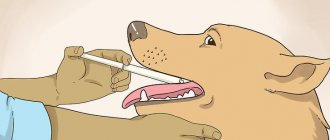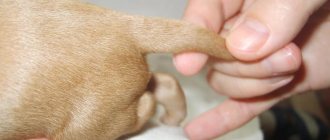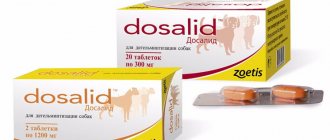When it comes to the need to give a dog a deworming pill, an inexperienced owner will see a picture of an “unequal battle” before his eyes: snapping jaws, a trembling tail under the table, a coughing dog, etc. Don’t worry, there are several methods that have been tested for a long time and are quite effective.
Do you have questions about whether you should fight your pet? What if he doesn’t have worms, and you give him a pill? We assure you that every dog has worms to a greater or lesser extent. You can keep the parasite population under control if you carry out preventative measures and observe the frequency of its implementation.
How often should a dog be wormed?
Even if your pet lives in sterile conditions and you think that he does not have worms, it is still necessary to regularly worm your puppy and adult dog for preventive purposes.
First deworming
Worms can even appear in newborn puppies. They become infected from their mother, for example through the placenta or milk. Therefore, the first treatment is carried out 3-4 weeks after birth. It is important to use special preparations marked “for puppies”.
The second time worming of puppies should be carried out 10 days after the first dose of the drug. This is necessary in order to remove parasite decay products from the body.
Breaks in domestic dogs
Even if an animal does not leave the apartment, this does not mean that it cannot be infected. Insects - flies and cockroaches - can be carriers of parasite eggs. Also, dirt from the street can be brought into the house on shoes and clothes by the owner himself.
The frequency of preventive deworming depends on the age of the animals. It is recommended to deworm dogs under one year of age once every 3 months. In adult animals, preventive treatment is carried out once every six months.
The number of procedures should also depend on nutrition. If an animal eats natural food (raw meat, minced meat, offal and fresh fish), the risk of infection with parasites increases. Therefore, it is recommended to carry out treatment once every 3-4 months.
For preventive purposes, the animal is treated for worms once. But if parasitosis is suspected, the drug is given again 10-14 days after the first procedure. When deworming, the drug acts only on adult parasites. After 1.5-2 weeks, intact worm eggs mature and grow. They are destroyed with the second dose of the drug.
Signs of parasitosis for which repeated deworming is recommended:
- blood, mucus or adult forms of worms in the stool;
- bloating, characteristic rumbling;
- increased appetite accompanied by weight loss;
- diarrhea and vomiting;
- constipation;
- The dog rubs its anus on the floor, reaching for its tail with its teeth.
Important! If an animal is to be vaccinated, it must be dewormed 7-10 days before vaccination.
Read Adenoma of the eye (third eyelid) in dogs: causes, treatment and prevention
How to give drugs to street pets
Animals that live or spend a lot of time outdoors are much more likely to become infected with worms. A dog can pick up worms, for example, by picking up something from the ground, drinking water from a puddle, or by contact with other animals. In this case, it is recommended to give the drug against worms 3-4 times a year.
Deworming for pregnant and lactating women
Deworming is contraindicated in pregnant and lactating dogs. This can negatively affect the health of the puppies. This is especially worth considering in the first half of pregnancy, when all systems and organs are formed in puppies, and any negative intervention can lead to the development of pathologies. It can also cause a miscarriage.
Attention! It is better to worry about getting rid of parasites in advance and worm the dog 1.5-2 weeks before mating. But during estrus it is not recommended to do this.
It is not always possible for the owner to rid the pet of worms before mating. What to do in this case? On the one hand, deworming during pregnancy is dangerous, and on the other hand, parasites can also negatively affect the development of the fetus.
The best option is to use a product that is not contraindicated for pregnant and lactating animals. It is recommended to worm a pregnant dog in the second half of its term, and it is best to do this under the supervision of a veterinarian. A nursing dog can be dewormed no earlier than 2-3 weeks after the birth of the puppies.
What to do to keep your pet healthy
1. Do not give your animal fresh raw meat. Either freeze or lightly boil. River fish are especially dangerous.
2. Don't let your dog pick up food from the ground.
3. Feed your pet only good food (super - premium or better) and keep the diet balanced. Nutrient deficiency is the most common reason for eating other people's feces, soil and grass.
4. If your companion likes to “graze” on the lawn, plant greenery for him yourself.
5. Buy products that have passed veterinary control. If you don't check, you endanger not only the dog's life, but also your own.
6. Maintain good hygiene. A person can bring worm eggs from public places.
By the way, we are also capable of “sharing” parasites with our pets. It is important to carry out prevention at the same time as your dog to ensure that you get rid of the worms.
Review of anthelmintic drugs
There are many dewormers for dogs. They can be either broad-spectrum for preventive treatment or targeted for getting rid of a specific type of parasite. It is recommended to select the drug based on the age and weight of the animal, as well as the recommendations of the veterinarian.
Anthelmintic drugs are produced in the form of tablets, drops, suppositories, suspensions and pastes. The release form does not play a key role when choosing a product. It is important that the owner is comfortable using it and accurately calculates the dose. For example, tablets and dragees are usually used for worming adults and large dogs. Dewormers for puppies and small breed dogs are often produced in the form of suspensions.
Here are the names of some anthelmintic drugs:
- Azipirin. The drug is intended for cats and dogs, available in tablets (1 tablet per 10 kg of weight). Destroys flat and round worms. The advantage is low toxicity. Therefore, it can be used for worming pregnant and lactating bitches. Azipirin can be given to puppies from the age of four weeks.
- Dehinel Plus. An anthelmintic that destroys round and tapeworms. Intended for dogs of large and medium breeds (1 tablet per 35 kg of weight). Suitable for deworming pregnant and lactating dogs in the second half of pregnancy. The drug can be given to puppies no earlier than 7 weeks.
- Prazitel. Has a wide spectrum of action against round and tapeworms. Available in the form of a suspension and tablets for puppies, small, medium and large breed dogs. The suspension comes with a special dispenser syringe. The drug is contraindicated in puppies under 2 weeks of age, pregnant and lactating bitches, as well as malnourished animals.
- Drontal plus. Taken at the rate of 1 tablet per 10 kg of animal weight. No pre-diet or laxative intake is required. As a preventative measure, it is recommended to use the drug once every 3 months, as well as 10 days before vaccination and 10 days before mating. This anthelmintic is contraindicated for puppies of small breeds, as well as dogs in the first 2/3 of pregnancy.
- Helmimax. The drug has three types of dosage: for dogs of small breeds (1 tablet per 2-4 kg of weight), medium (1 tablet per 5-10 kg of weight) and large breeds (1 tablet per 10-20 kg). The product is allowed to be taken by pregnant bitches, but no later than 3 weeks before giving birth. The chicken flavor makes the anthelmintic appetizing to the animal, but can provoke an allergic reaction.
Read Causes, symptoms, diagnosis and treatment of piroplasmosis in dogs
Some people prefer to remove parasites using folk remedies, for example, celandine, tansy infusion, pumpkin seeds, garlic, etc. Some of them not only do not have proven effectiveness, but can also be dangerous for the animal. If you are used to giving your dog decaris for worms, be sure to follow the dosage and take into account contraindications.
What medicines for worms should I buy? What helps better?
There are many classifications of anthelmintic drugs. For convenience and greater understanding, we will consider only two classifications - by mechanism of action and dosage form.
All antihelminthic drugs can be divided according to their mechanism of action into several groups:
- These are drugs that can destroy the outer shell of worms (Praziquantel, Phenasal).
- Drugs that have a paralytic effect on the nervous system of parasites (Pyrantel, Albendazole).
- Drugs that disrupt the metabolism in the body of worms (Albendazole, Mebendazole).
Based on the type of dosage form, antihelminthic drugs are divided into:
- Pills . Tablets help dogs get rid of worms quite effectively. They are the most common form of medications.
- Capsules.
- Suspensions . The form in which a drug substance is suspended. It is dosed either with a syringe or a special measuring spoon. Very convenient to use when treating puppies.
- Pastas . Most often used to kill worms in puppies. The big advantage is the relative safety and pleasant smell and taste (usually puppies eat with pleasure).
- Drops on the withers . Quite effective and easy to use product. The average validity period is up to three or even six months. The big disadvantage is the huge number of fakes.
- Candles . Quite a rare form of use.
- Injectable and oral solutions . An effective form for the treatment of helminths. Experience is required to accurately dose and administer the drug.
For the treatment of helminths, a folk remedy such as pumpkin seeds is widely used. The peel of pumpkin seeds contains cucurbitin.
Under its influence, the worms are not destroyed, but fall into a state of suspended animation, hibernation. And since pumpkin has a mild laxative effect, it is eliminated from the body faster. Pumpkin is not a panacea for treating worms.
Important! Dogs should never be given medications intended for humans. The medicinal substance included in the drug is the same, but the excipients of the drug are different. Dogs and humans react differently to the same fillers.
There are dog breeds that are hypersensitive to anthelmintics. These include:
- Australian Shepherd.
- Bobale.
- Collie.
- Whippet is long-haired.
- The Windhound is silky.
When treating dogs of these breeds, you need to be as careful as possible.
Watch the video: A professional doctor talks about worms in animals
How to properly worm a puppy and an adult dog
Before you start driving away worms, it is recommended to prepare the animal’s body using some kind of immunostimulant. If you are giving deworming to your dog for the first time, you should have an absorbent on hand. An absorbent is also necessary when you give anthelmintic drugs to puppies and weakened animals. Before giving your dog deworming medication, you need to get rid of fleas and ticks.
If the instructions for the drug do not contain specific instructions, it is better to give the deworming remedy to the animal in the morning on an empty stomach. Before deworming, your pet must be weighed in order to correctly calculate the dosage of the drug. You should not give the product “by eye” - an overdose can cause poisoning.
If your pet vomits or spits out part of the tablet, you do not need to give a second portion of the drug right away. It is better to repeat the procedure after 10-14 days. It is advisable that the dog has a bowel movement within 6-8 hours after taking the drug. If this does not happen, you can give your pet a laxative. When using drops on the withers, it is not recommended to bathe the dog for at least 2 hours after treatment.
Important! Often, deworming drugs cause dehydration and thirst. Therefore, the dog should have free access to clean drinking water.
Diagnostics
All pet owners are concerned about the question - how to understand that a dog has worms? If your dog exhibits at least one of the above symptoms, you should immediately collect a fecal sample and take it for a stool test. Collection of samples is carried out with a disposable spatula or spoon. The collected material is placed in a plastic container with a tight lid.
The sample can be stored in the refrigerator for a while, but it is best to get it to the clinic as soon as possible. If necessary, the veterinarian may order a repeat stool sample collection. To exclude a “false negative” result, you will need to collect fecal samples for three consecutive days.
To make a diagnosis, the doctor will need to study the anamnesis: the animal’s habitat and habits, diet. Sometimes the owner can independently detect worms or parts of them in the pet’s feces - this should also be reported to the veterinarian.
Contraindications for worming
Anti-worm medications are toxic, and their uncontrolled use can cause deterioration in the animal’s health. Deworming has a number of contraindications that must be taken into account. Deworming is contraindicated:
- sick, weak and exhausted animals;
- dogs after surgery;
- puppies up to 2 weeks;
- if the animal has external parasites: fleas, lice, ticks.
Read Causes of pug ear allergies: treatment methods and diet
Antihelmintics should be given with caution:
- pregnant and lactating dogs;
- animals with chronic diseases;
- animals prone to allergies.
Condition after cleaning: normal and deviations
Toxic substances in the drug and decay products of parasites in the animal’s body can cause intoxication. Therefore, it is important to monitor the dog’s condition and behavior, especially in the first hours after taking an anthelmintic.
Warning signs:
- lack of coordination, unsteady gait;
- convulsions;
- dilated pupils;
- increased salivation;
- vomiting mucus, watery diarrhea after deworming;
- pallor or cyanosis of the mucous membranes;
- the dog does not eat and refuses water;
- can't go to the toilet.
If the dog feels unwell after deworming, it is necessary to induce vomiting in the pet so that it vomits, and then give it an absorbent. If this does not help, you need to contact your veterinarian.
Important! If your pet is very lethargic after treatment, pay attention to his feces. If there are no dead worms in them, there is a chance that they are curled into a ball that cannot pass through the intestines. Perhaps the pet got sick because of this.
To avoid having to treat your pet for worms, it is important to pay attention to preventive measures. And this is not only the timely use of pharmaceutical drugs. Try not to let your animal walk on its own, and during a walk, watch your pet so that it cannot eat something from the ground or drink water from a puddle or open reservoir. Also, do not forget to treat the animal for fleas, which are carriers of internal parasite eggs.
Symptoms of worm infestation
- In case of moderate glistening of the pet’s body, general weight loss is observed against the background of increased appetite; in severe cases, refusal to eat, lethargy, and apathy (poisoning of the animal’s body with toxins).
- Infection of the body with worms can be accompanied by vomiting, foam, and lumps of worms; There may also be diarrhea streaked with blood, mucus, and worms. In some animals, on the contrary, constipation is observed, which is associated with blockage of the intestinal lumen by a ball of worms.
- Dull fur, brittleness, peeling claws, the white of the eye with a bluish tint, perverted appetite - the dog happily eats paper, soil, clay (signs of anemia).
- Enlargement and bloating of the pet's abdomen (especially noticeable in puppies), rumbling in the stomach, and an increase in the size of the liver.











